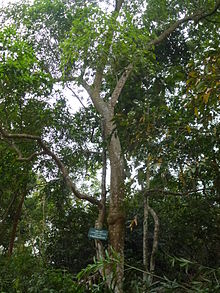Ixonanthes reticulata
| Ixonanthes reticulata | |
|---|---|

| |
| Scientific classification | |
| Kingdom: | Plantae |
| Clade: | Tracheophytes |
| Clade: | Angiosperms |
| Clade: | Eudicots |
| Clade: | Rosids |
| Order: | Malpighiales |
| Family: | Ixonanthaceae |
| Genus: | Ixonanthes |
| Species: | I. reticulata
|
| Binomial name | |
| Ixonanthes reticulata | |
| Synonyms[2] | |
| |
Ixonanthes reticulata is a species of plant in the Ixonanthaceae family. It is native to an area from China to India (Assam and Meghalaya) to mainland and maritime Southeast Asia.[2][3] It is a broadleaf evergreen.[4]
Conservation
[edit]Ixonanthes chinensis was assessed as "vulnerable" in the 1998 IUCN Red List, where it was described as native to China and Vietnam.[5] As of January 2024[update], Ixonanthes chinensis was regarded as a synonym of Ixonanthes reticulata, which has a wider distribution.[2]
Ixonanthes khasiana was also assessed as "vulnerable" in the 1998 IUCN Red List, where it was described as native to Assam and Meghalaya.[6] As of January 2024[update], Ixonanthes khasiana was also regarded as a synonym of Ixonanthes reticulata, which has a wider distribution.[2]
References
[edit]- ^ de Kok, R. (2024). "Ixonanthes reticulata". IUCN Red List of Threatened Species. 2024: e.T198191790A203234321. doi:10.2305/IUCN.UK.2024-1.RLTS.T198191790A203234321.en. Retrieved January 4, 2025.
- ^ a b c d e "Ixonanthes reticulata". Plants of the World Online. Royal Botanic Gardens, Kew. Retrieved 27 December 2023.
- ^ "Ixonanthes reticulata". Catalogue of Life. Species 2000: Leiden, the Netherlands. Retrieved 28 December 2023.
- ^ Yang, Q; Li, M; Wang, B; Li, R; Wang, C (2003). "[Dynamics of biomass and net primary productivity in succession of south subtropical forests in southwest Guangdong]". Ying Yong Sheng Tai Xue Bao. 14 (12): 2136–40. PMID 15031902.
- ^ Sun, W. "Ixonanthes chinensis". IUCN Red List of Threatened Species. 1998: e.T32414A9704389. Retrieved 11 January 2024.
- ^ World Conservation Monitoring Centre. "Ixonanthes khasiana". IUCN Red List of Threatened Species. 1998: e.T32865A9736946. Retrieved 11 January 2024.

